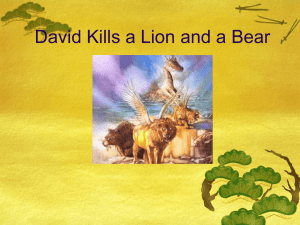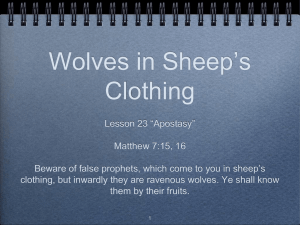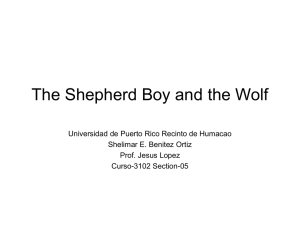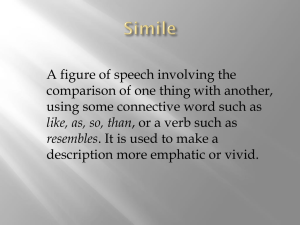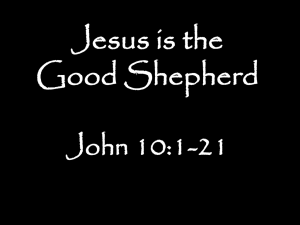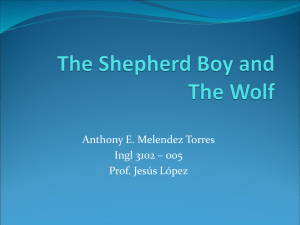The Lost Sheep based on Luke 15:3-7
advertisement
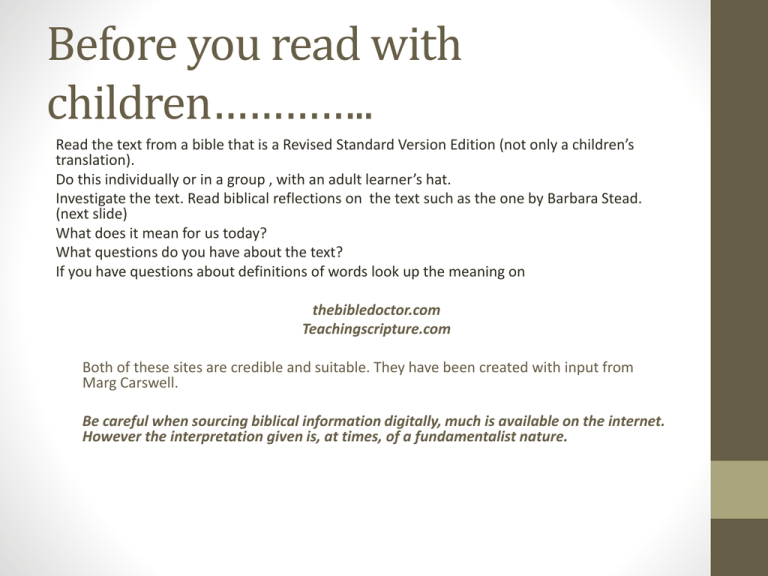
Before you read with children………….. Read the text from a bible that is a Revised Standard Version Edition (not only a children’s translation). Do this individually or in a group , with an adult learner’s hat. Investigate the text. Read biblical reflections on the text such as the one by Barbara Stead. (next slide) What does it mean for us today? What questions do you have about the text? If you have questions about definitions of words look up the meaning on thebibledoctor.com Teachingscripture.com Both of these sites are credible and suitable. They have been created with input from Marg Carswell. Be careful when sourcing biblical information digitally, much is available on the internet. However the interpretation given is, at times, of a fundamentalist nature. Stead B, (1994) A Time of Jubilee: Using Luke’s Gospel with Children Desbooks Thornbury The Lost Sheep based on Luke 15:3-7 Jesus told this story. This story is a parable. It comes from the bible. The bible is a group of sacred stories. This story is a Gospel story. This story comes from the the Gospel of Luke. There was once a shepherd who had one hundred sheep. What a lot of sheep! Every day he counted the sheep. Everyday, he counted them again and again and sure enough, there were one hundred. One day, he counted them: “One, two, three…….ninety seven, ninety eight, ninety nine?” He counted them again to make sure! Oh no, there was one missing! Oh dear! One of his sheep was definitely missing! The shepherd left the ninety nine sheep and he searched and searched for the lost sheep. He looked in the valleys and he looked on the mountains. He looked everywhere. He looked behind bushes, he looked behind rocks. He couldn’t find it! He didn’t stop looking until at last he found the lost sheep. “There you are!” he said when he found it, “What are you doing here all alone?” The shepherd was very pleased that he had found his lost sheep so he took the sheep and carried it on his shoulders. He was so pleased that he told all his friends and neighbours. Questions before reading: Look at the front cover. I wonder what this story is about? I wonder do you know anything about sheep? I wonder do you have anything that is precious? I wonder does someone in your family have something precious? Have you ever lost something? In this story someone loses something let’s read it together. During the story……….. Slide 4 Do you have any special stories you have each night? Do you prefer stories that are told or read? Why? Slide 5 Do you have a favourite toy or something you use each day? Why is it special? Do you have a lot of something, like pencils or lego? Do you have something that you keep counting over and over again? Slide 6 I wonder if all the sheep feel the same? I wonder does the shepherd treat all the sheep the same? Slide 7 Have you ever lost something? How does this make you feel? What advice would you give this shepherd? During the story……….. Slide 8 I wonder why he left all of those sheep to find one lost one? Slide 9 Have you been to any places like these ? I wonder what could happen to the rest of the sheep when he goes to all these places looking for the lost sheep? Slide 10 Was it important for the shepherd to find the lost sheep? What would you have done if you were the shepherd? Why? Slide 11 When have you been pleased when you have found something that has been lost? I wonder does the shepherd remind you of anyone in your life? How? After the story……… Why do you think a story like this would have been written? I wonder how the shepherds’ feelings changed during the story? Why do you think their feelings changed? I wonder how the sheep that went missing was feeling? Or the sheep that were left behind? Do you have a favourite part of this story? Why? Story Grammar Plan Name _____________________________ Text_____________________________________________________________________ Setting Information about characters time location Initiating event Initiating response The characters’ thoughts and feelings. Internal plan What are they thinking of doing? Attempt Actual action taken. Direct consequence What happened because of what the characters did? Ending Bibliography • Awakenings Core Document (2005) Catholic Diocese of Ballarat • Catholic Youth Bible (2000) Saint Mary’s Press Washington D.C. • Davison L..G. (2013) An introduction to the Catholic School Identity Research Project (ECSIP) and some implications for the teaching of Religious Education Paper presented to the 8th National Symposium on Religious Education and Ministry ACU Canberra , April 2013 • Carswell, M (2011) teachingscripture.com and thebibledoctor.com found at http://www.teachscripture.com http://thebibledoctor.com • Hall G. (2007) Let’s Play .Puppets Tell Parables Redemptorist Publications Hampshire • Photos http://www.bing.com/?FORM=HDR HME&pq=photo of sheep • Oral Language Supporting Early Literacy 2013 found at http://www.olsel.catholic.edu.au • Ryan, M (2001) Teaching the bible Social Science Press Katoomba • Stead, B (1994) A Time of Jubilee Using Luke’s Gospel With Children . Desbooks Thornbury


